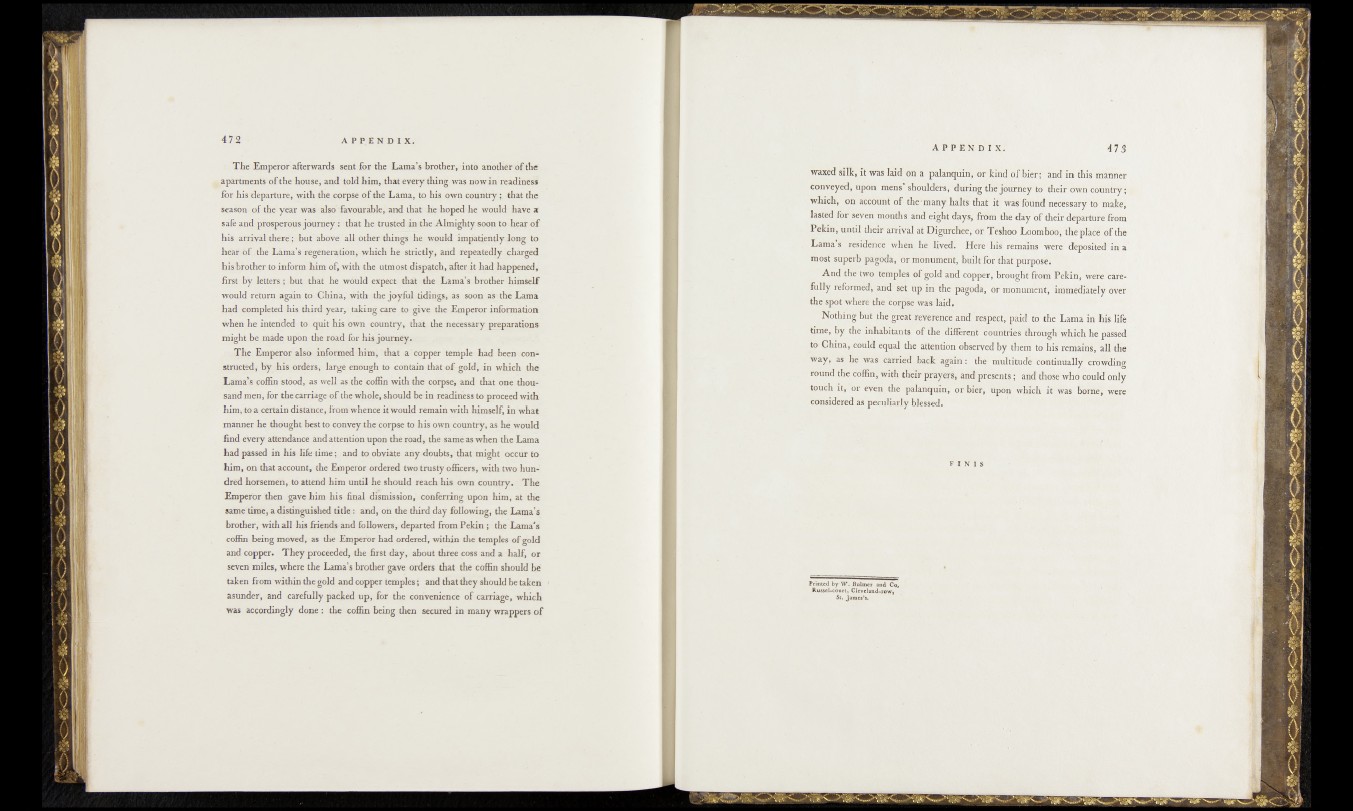
The Emperor afterwards sentfbr the Lama’s brother j into another of the
apartments of the house, and told him, that everything was now in readiness
for his departure, with the corpse of the Lama, to his own country; that (he
season of the year was also'favourable, and that he hoped he would have z
safe and prosperous journey: - that he trusted .in the Almighty soon to hear of
his arrival there; but above all other things he would impatiently long to
hear of the Lama’s regeneration, which he strictly, and repeatedly charged
his brother to inform him of, with the utmost dispatch, after it had happened,
first: by letters; but that he would expect that the Lama's brother himself
would return again to China, with the joyful tidings, as soon as the Lama
had completed his third year, taking care to give the Emperor information
when he intended to quit his own country, thait the necessary preparations
might be made upon the road for his journey.
. The. Emperor also informed him, that a ' copper temple had been constructed,
by his orders, large enough to contain that of-gold, in which the
Lama’s coffin stood, as well as the coffin with the corpse, and that one thousand
men, for the carriage of the whole, should be in readiness to proceed with
him; to a certain distance, from whence it would remain with himself, in what
manner he thought best to convey the corpse to his own country, as he would
find every attendance and attention upon the road, the same as when the Lama
had passed in his life time; and to obviate any doubts, that might occur to
him, on that account, the Emperor ordered two trusty officers, with two hundred
horsemen, to attend him until he should reach his own country. The
Emperor then gave him his final dismission, conferring upon him, at the
same time, a distinguished title: and, on the third day following, the Lama’s
brother, with all his friends and followers, departed from Pekin; the Lama's
coffin being moved, as the Emperor had ordered, within the temples of gold
and copper. They proceeded, the first day, about three coss and a half, or
seven miles, where the Lama’s brother gave orders that the coffin should be
taken from within the gold and copper temples; and that they should be taken
asunder, and carefully packed up, for the convenience of carriage, which
was accordingly done: the coffin being then secured in many wrappers of
waxed silk, it was laid on a palanquin* o A iia d /o lp ||r; and in this rnmber
conveyed, Upon mens shoulders, during the journey to their own co ilntiv^
which, on account o f the‘many halts that it* was foundnecessary to make,
lasted for seven months and eight‘days, frbm the day o f their departure from
Pekin, until their arrival atfgiVrcji'Ce, or.TeShoo® dbr^lS^|^fe’place o'f the
Lama s residence H^re','ni^ remains were deposited in a
most superb pagoda, d^'mdnumedt, bmh^for^Bafpurposei' n '
And the’fwo temples of gold and ,copper5 Erougfe fr;om Pekin, were care-1
fully reformed) arid set up in the pagcidd^o’^incuiuiiirttlf^mmeoliately over I
the spot where the corpse was laid.
‘"Nothing but the great reverence'arid» respect, paid’ to the’ Lama in his life I
time, by the inhabitants of the diffete^^^fflb!i^%rou^i*'which he passed
to China, dotild equal the attention observed by them to his remains, all the
■ foajf, as he was carried hack again: the mffititucfe^cbj^|nn^,]jffc^wding
round the coffin, with their prayers, and presents; and those’who ^ulcf only
touch it* or even the palanquin, or bier, upon which it was borne, were
considered as peculiarly blessed.
f i n I s
Printed byW , fiulmer and Co,
Russel-coSu,r.tJ, TCOle«v>e,l.and-row*